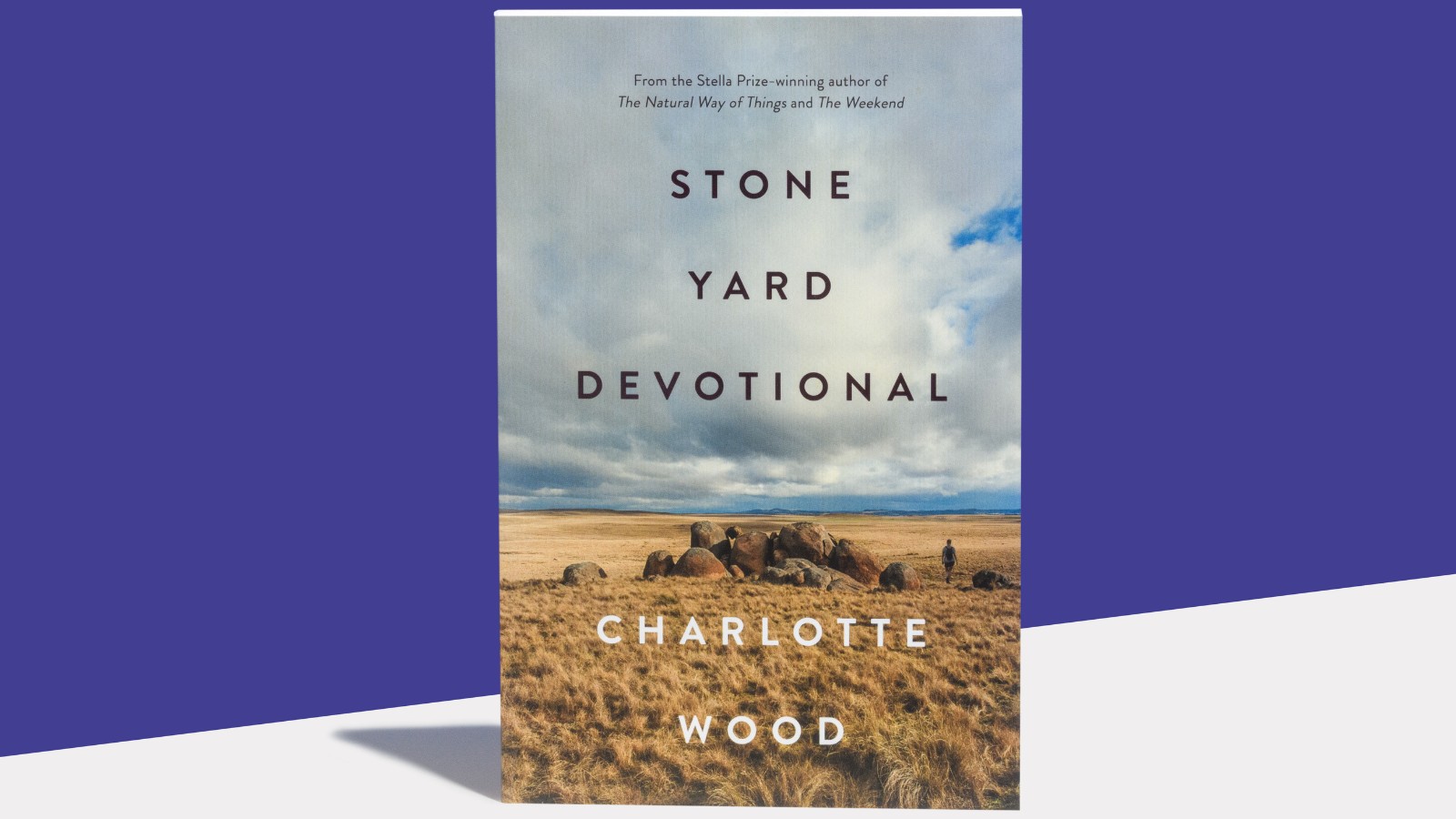Fiction Shortlist

Title: Stone Yard Devotional
Author: Charlotte Wood
Publisher: Allen & Unwin
A woman abandons her city life and marriage to return to the place of her childhood, holing up in a small religious community hidden away on the stark plains of the Monaro.
She does not believe in God, doesn’t know what prayer is, and finds herself living this strange, reclusive life almost by accident. As she gradually adjusts to the rhythms of monastic life, she finds herself turning again and again to thoughts of her mother, whose early death she can’t forget.
Disquiet interrupts this secluded life with three visitations. First comes a terrible mouse plague, each day signalling a new battle against the rising infestation.
Second is the return of the skeletal remains of a sister who left the community decades before to minister to deprived women in Thailand – then disappeared, presumed murdered.
Finally, a troubling visitor to the monastery pulls the narrator further back into her past.
With each of these disturbing arrivals, the woman faces some deep questions. Can a person be truly good? What is forgiveness? Is loss of hope a moral failure? And can the business of grief ever really be finished?
A meditative and deeply moving novel from one of Australia’s most acclaimed and best loved writers.
Photography by Sarah Walker
Judges’ report
Charlotte Wood’s Stone Yard Devotional is an intimate study of grief and the power of retreat where the writing profoundly mirrors the themes. Here there is nothing to prove, no outward display or performance, but rather a deep quiet, at times unsettling and at other moments, healing. A woman leaves the distractions of the city and relationships to return to where she grew up and enters a self-imposed isolation in a religious community. Without faith in God and grieving her mother, she chooses a time of seclusion, with visitations and profound questioning of hope, goodness, loss and forgiveness. The word ‘Devotional’ in the title, captures the heart of this story, somewhere between prayer, remembrance and breathing through the pain of living with death.
Extract
THE BONES AND Helen Parry are on their way here. Today.
In the night I dreamed of a garden party. Someone had for sale a small velvet-lined box containing a collection of tiny fossils: each one an entire, perfectly formed, minuscule dinosaur in a different delicate colour. A pterodactyl, a tyrannosaurus, an iguanodon and others. Before I could ask the price – I wanted to buy them very much – a child upended the box and spilled the tiny fossils into the rich green lawn. I fell to my knees in silence, desperately searching the grass for the creatures before the loss was discovered.
This afternoon, a large black hearse slid into the drive and parked. Three reverential funeral directors from Sydney climbed out of the car and stood in their dark suits in the bright sunlight. It was startling at first to see the row of black masks, but then we remembered. I think they, in turn, were shocked to see us without them.
They opened the back of the hearse and drew out a folding steel trolley, flicked down its legs and then expertly slid onto this a small, plain, brown wooden casket. They snapped some locks and spun the trolley around on its big rubber wheels, surprisingly smoothly on the gravel, and manoeuvred it up one stone step then another, over the lip of the threshold and in through our front door. We lined the tiled hall with our heads bowed as the trolley passed, as the remains of a murdered woman moved through our home, down the corridor and into the good room, where the armchairs had been pushed to the walls, the little nest of tables removed. A trestle table had been brought into the room and covered with a white damask cloth.
We followed the men into the room, crowded near the door to watch them snap the brakes on the trolley and unlock the grips on the casket. They moved around their cargo, checking, squatting then rising again, following one another’s movements. I was reminded of airline stewards doing their safety checks at the doors of aeroplanes, running their unconscious hands over locks and handles, belts and buckles, reversing and swapping positions as in a dance, muttering their coded safety language. The masked men looked at one another and one murmured, and in a single smooth movement they lifted the casket onto the trestle table. They silently adjusted, straightened Sister Jenny’s coffin, then stepped away.
Bonaventure and Simone stood at the end of the table, facing the last bodily remains of their friend. They stood with their backs to us, erect and calm. I had a vision of the two of them poised at the edge of a vast, flat stretch of water, like a sea or a lake, that they must now find a way to cross. I hoped one would reach for the other’s hand, but they did not do that. At least, they did not do that in our presence, but then we left them in the room and closed the door. After that, who knows. We waited silently in the hall with the funeral men, who stood – trained, respectful – with their hands clasped at their groins and feet firmly planted. Their eyes were downcast but now and then they glanced up, watching us from behind their masks. I watched us too, through their eyes. How strange we must seem, gathered here morosely in a hallway, no ritual to hide or protect or guide us. We heard a few sounds from inside the room. Low talking, some creaking of floorboards, and then a stretch of no sound at all. After a time the door opened and Simone told the men they must have a cup of tea, and gestured for them, for all of us, to follow her to the sitting room. She and Bonaventure led our little procession down the corridor.
I went to follow but then I stopped and went into the good room and stood alone with the bones. The casket is very plain, the wood unfinished and dry to the touch. I thought of that creature, the size of a large child, lying there dead in her box.
I don’t know why I wrote ‘creature’.
The car that delivered Helen Parry was a silver Audi with spatters of orange mud streaked along its doors. I watched from the good room window as her lean form levered itself out from the driver’s seat, gripping the doorframe. She did not wear the veil, of course: as she emerged from the car I saw a navy sweatshirt, boyish blue jeans. Outlandish sunglasses, enormous on her face. She let the glasses drop then, and they swung from a cord around her neck as she turned to look directly at my window. At me.
I knew she could not have seen me here in the dark room because of the window’s reflection, but still I felt my heart pitch in my chest. Physically, I mean, I felt it move with fear. Yet at the same time I knew she would not recognise me. It has been almost forty years since I spoke to her in the forest, and on that day she had looked through me, towards some larger purpose or experience than I could perceive.
Even back then, I told the bones inside their box, I was never visible to her.
About the author

Photo by Carly Earl
Charlotte Wood is the author of ten books – seven novels and three non-fiction works. She has won the Stella Prize and the Prime Minister’s Literary Award, among others, and her features and essays have appeared in The Guardian, New York Times, Sydney Morning Herald, The Monthly, Saturday Paper and others. She lives in Sydney.
Related Posts

Read
What's on in May: Resident Organisation Round Up
29 Apr 2024

Read
Anne-Marie Te Whiu Receives The Next Chapter Alumni Poetry Fellowship
2 Apr 2024

Read
What's on in April: Resident Organisation Round Up
28 Mar 2024

Read
Blak & Bright First Nations Literary Festival returns in 2024
7 Mar 2024

Read
What's on in March: Resident Organisation Round Up
29 Feb 2024

Read
Hot Desk Extract: International
23 Feb 2024
Share this content